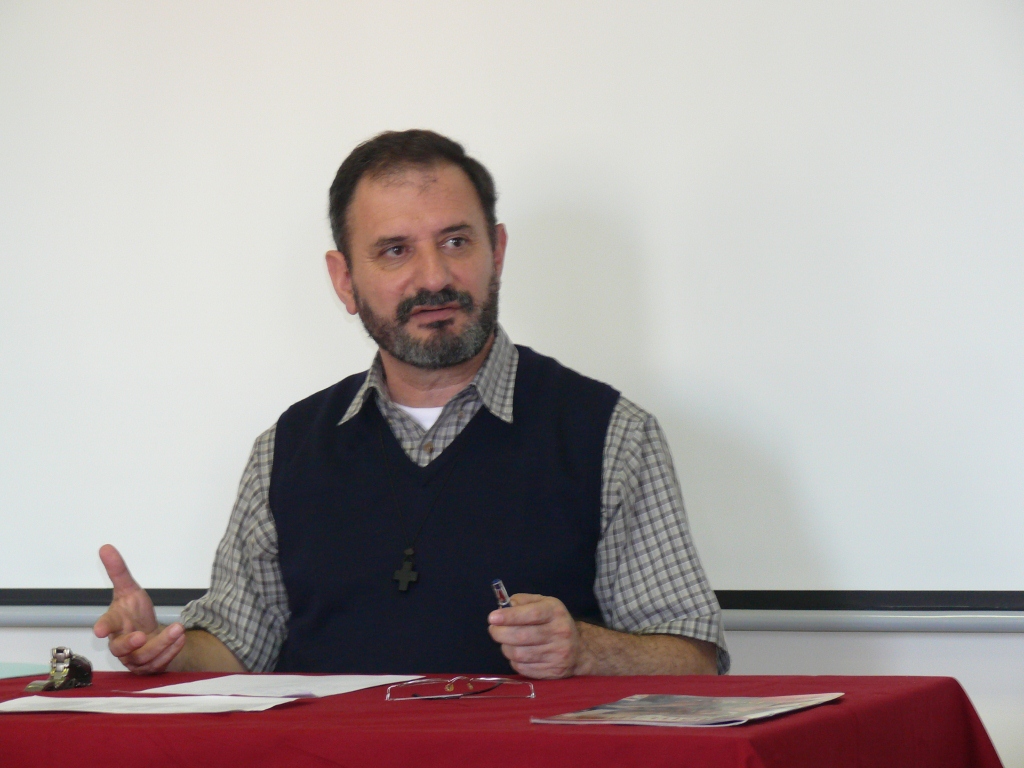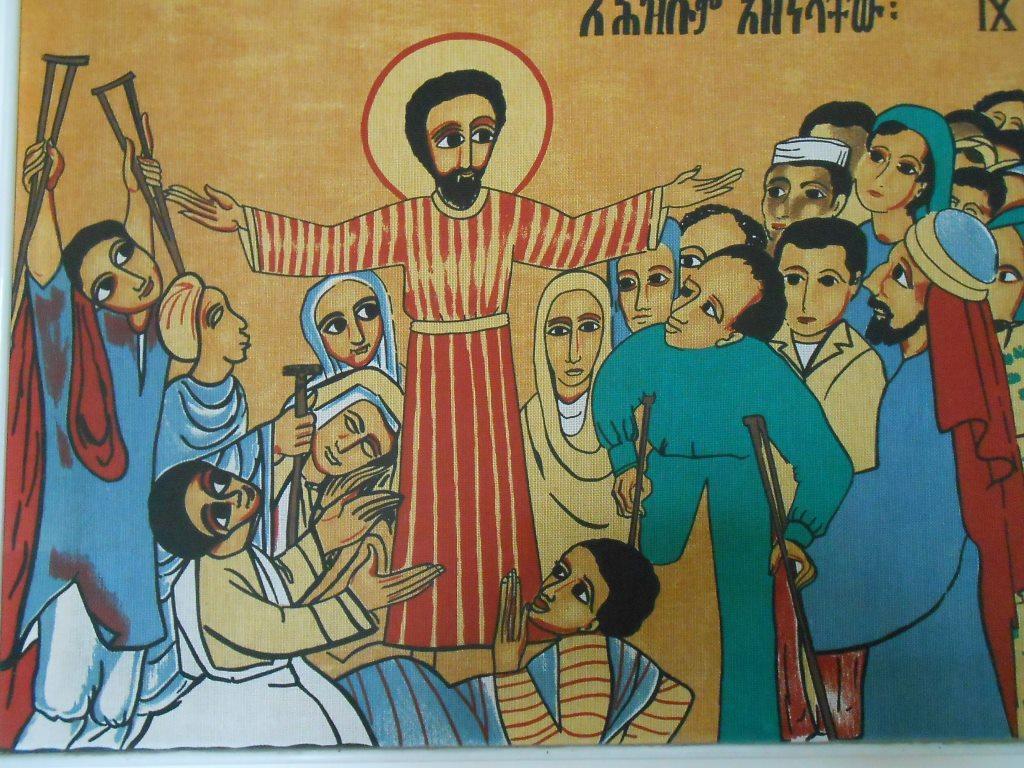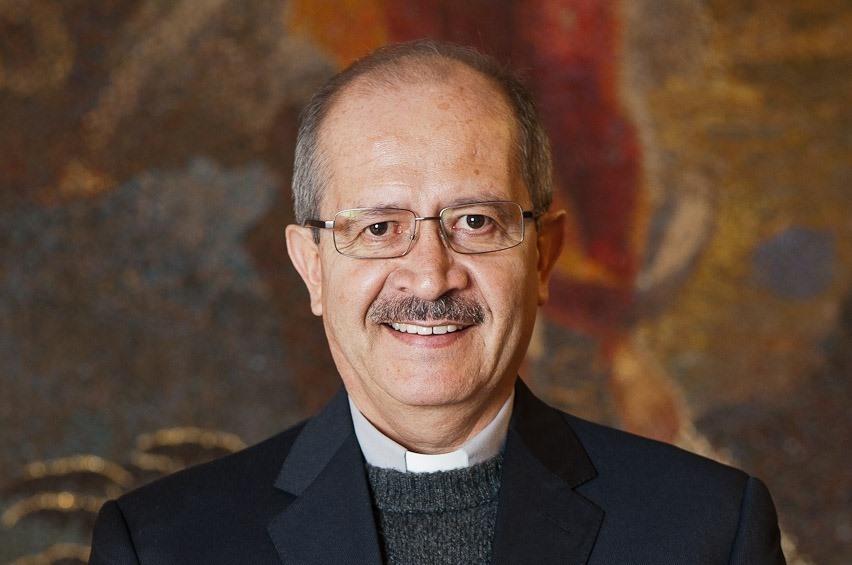Daniel Comboni
Comboni Missionaries
Institutional area
Other links
Newsletter
Rome, Friday, June 15 2012
The feast of the Sacred Heart of Jesus – today 15th of June – offers us, once again, the opportunity to reflect on the spirituality that sustains our missionary commitment and allows us to go to the sources that give us the strength to carry on in our vocation with confidence and enthusiasm. Happy feast of the Sacred Heart.
Fr. Enrique Sánchez G.
I would like to start this brief reflection by reminding us all that the spirituality or devotion to the Sacred Heart of Jesus, as we have inherited it by St. Daniel Comboni, is far from the experience of pietism which would like to see in the icon of the Heart of Jesus just a place to retreat when we wish to escape from situations that are unpleasant and that we are facing today in our world.
The Sacred Heart is not simply the image upon which we can cast our desire for affection, comfort, understanding, or any other need of ours. These, in fact, many times are purely manifestations of our selfishness and inability to enter into a relationship of love that entails the offering of self, without expecting anything in return.
The contemplation of the Heart of Jesus, as it is being proposed in our spirituality, will never bring us to an experience that is intimate, away from the life and the reality of our humanity, but it will rather bring us to a greater depth and closeness with those who are the recipients of our missionary love.
The Heart of Jesus compels us to fix our gaze on him, to understand what it means to love a human being with the love that can only come from God. The contemplation of the Heart of Jesus will be nothing but the opportunity to learn to love as God loves.
A great lesson
To begin with, it is not difficult to say that the first lesson in approaching the Heart of Jesus is the disillusionment which contrasts with the widespread mentality of our time, where everything seems centred in personal interests and makes us understand that none of us can live for himself only and that no one can truly love while remaining self-centred.
The Heart of the Lord shows us that love is giving and that it implies a moving away from self. It means the giving up of what we like and satisfies us, like when we ignore the others or keep them away from our little world; a world where we feel the sole masters and owners.
The love that flows from the Heart of Jesus is a missionary love that goes in search of the most distant, the most abandoned, of those who do not count in the eyes of the world, who are not considered in a statistical production.
It is the kind of love that becomes a beggar, that gets mixed up and lost in the daily life of people, which seeks space in the heart of the human being to transform everything it touches into a new reality.
The experience of this love has been passed on to us by that beautiful text of St. Paul in the Epistle to the Philippians, where he speaks of the feelings of Jesus Christ: “Though he was in the form of God, he didn’t consider equality with God a thing to be grasped, but emptied himself, taking the form of a servant, being made in the likeness of men. And being found in the human form, he humbled himself, becoming obedient to death, even death on the cross” (Phil. 2:6-8).
The love of God can be understood only when we place ourselves at the foot of the cross, when we enter into the logic of the absurd – according to the logic of power –, because that’s where it becomes clear what St. John says, seemingly very simply but with great depth: “For God so loved the world that he gave his only Son, that whoever believes in him should not perish but have eternal life” (Jn 3.16). To love in this sense means God’s total gift of Himself to us, the emptying and total surrender of the Lord who, without reason and without an explanation that is capable to satisfy our mentality so conditioned by the need to speculate and to pursue profit, becomes a gift that opens up to life itself. This is what love means and there is no greater love than this.
Heart and love are notes of the same music
When we speak of love, while contemplating the Heart of Jesus, we have no difficulty in understanding that it means God’s total and radical surrender, with the only purpose that those who accept it may live in fullness, forever.
In everyday life this means the ability to allow ourselves to be astonished, surprised and amazed by a God who continually creates love. It is no coincidence that the Heart that represents the essence of God is portrayed as an open heart from which flows a river that never dries up, because the love of God is unlimited and has no end; it is an ever-present offering to those who are willing to receive it.
The insights of Comboni
Comboni understood very well the mystery that is contained in the spirituality of the Heart of Jesus. We know that for him the interest for the Heart of Jesus went beyond the merely fixing of his gaze on the reparation dimension, highlighted in the devotion of his time.
St. Daniel discovered that in that open heart there was something deeper, there was the mystery of God who wants to show that his love is the source of life and the possibility of a new humanity.
It is through the prism of the love of Christ that Comboni learns to see reality and realizes that only that love can give birth to a humanity where all people can enjoy freedom, justice and the gratitude of sons and daughters of God that makes us all equal and all brothers and sisters.
“This divine heart bore the piercing of the enemy’s lance in order to pour forth from that sacred wound the sacraments through which the Church was founded. This Heart has never ceased to love men, but to this very day continues to live on our altars, a prisoner of love and a victim of propitiation for the whole world.” (Writings 3324)
It is this Heart of Jesus that urged St. Daniel Comboni to go far away, because love is fearless, and it urged him to consecrate his life, his work and his efforts, his sacrifices and his labours, his misunderstandings and his joys, all for love.
It is a love that he has experienced, a love by which he felt himself deeply loved and, therefore, he felt sent to become a witness of God’s passionate love for the most abandoned.
It is love that gives birth to the mission and supports it even in the most obscure and difficult of times, because love has its logic and way of operating that open to faith and hope.
It is a love that knows no fear or discouragement; it is the experience of discovering that we are in the Lord’s hands. It is the experience that reminds us that in love there is no room for fear and that for those who love everything is transformed into something good.
In the heart of the mission
Today, in a world dominated by the shadow of violence, hatred, war, the many injustices that we witnessed first-hand, today, in our society that is going through a period of confusion, uncertainty, apprehension when facing the future, while mistrust is on the increase and the others are considered a threat, in a humanity that, during crisis, develops strategies to withdraw into itself, in a world that seeks a way out and expects answers to all its questions, the mission seems to have become an emergency feat with regard to announcing the love of God to this favourite humanity of his.
When we witness that humanity cannot succeed in finding lasting and convincing solutions, in the depths of our being missionaries resounds the voice of the Lord who invites us to say his word, to offer his proposal about sharing his love, because it is only He who can save, it is only He who can sow in the heart of our contemporaries the seed of the meaning of life, which does not exist outside of the Love that only God can offer us.
In the heart of the mission we are called to become the first witnesses of God’s passionate love for every human being. We are asked to become credible witnesses of this love and this entails to pay with one’s life the price of love. It means being able to announce by our witness – and not just by our words – that we are the tools the Lord uses to show his goodness and his closeness to the people he loves.
It means the ability to be close to and to be together with the most abandoned, with those who cannot give us anything in return for our generosity, with those who are not known or recognized by anyone.
It means to become an opportunity for a humanity which is different, new, previously unknown, where God’s love makes possible all that we are not even capable of imagining, because our hearts are a little damaged and lack training in love.
May the Heart of Jesus help us become initiators of a new mission for our time and, without making noise, may our missionary witness be for many of our brothers and sisters an opportunity to open up to the Love that is in God, which knows no boundaries and is for all.
Happy feast of the Sacred Heart.
Fr. Enrique Sánchez G., mccj
Superior General
June 2012






.jpg)